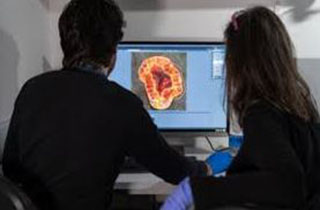
Israelis create cancer drug without animal tests by using human-simulating chip
Israelis create cancer drug without animal tests by using human-simulating chip. The Hebrew University professor says the technique, which mimics the human body, can now save time, animal lives and money, and develop new treatments.
Professor Yakov Nahmias (right) and researcher Aaron Cohen, near the “Human Simulator” chip (courtesy of Hebrew University)
Professor Yakov Nahmias (right) and researcher Aaron Cohen, near the “Human Simulator” chip (courtesy of Hebrew University)
Israeli scientists have developed a cancer-free medicine for animals used on animals without a chip that mimics the human body.
Researchers at the Hebrew University have developed a human tissue chip using microscopic sensors to monitor the human body’s response to kidney, liver, and heart-specific Treatments with drugs
Implant innovation is a 30-year-old concept.
Nevertheless, the Israeli team is believed to be the first group to successfully develop a new treatment using chip capabilities to eliminate animal testing.
Israelis create cancer drug without animal tests by using human-simulating chip
Receive via Israel Daily Startup Email and never lose our free stories for free signatures
Israelis create cancer drugs without animal tests by using a human-simulating chip. He is so confident in his research that he has paired two existing drugs to solve excess liver fat caused by some cancer patients who have received patents, clinical trials, and approval from the US Food and Drug Administration—submitting the compound for When skipping regular animal testing.
Read more:
Scientists Find a Natural Protein That Stops Allergies And Autoimmune Conditions
How to Help Someone Who’s Depressed
How to lose belly fat naturally in 1 week
The “Animal Flight sim” chip, which also provides data on how the kidneys, spleen, and heart behave to a drug, makes the following declaration (Courtesy of Hebrew University)
The breakthrough was announced Monday in the latest issue of the journal Science Translational Medicine.
“To the authors’ knowledge, it’s the first period a drug has gone this far without measuring animals, and the reason for this is that we’ve eliminated the need for testing on animals by utilizing our human-on-chip technology,” says the researcher.
The professor said—Yakov Nahmias, who is leading it. The investigation told the Times of Israel.
Researchers from Professor Yakov Nahmias’ team look at the data from the “hum simulator” chip. (Courtesy University of Haifa)
This is the first proof that such software can be used to
thwart animal experiments and that this could lead to faster, safer, and more effective drug development.” It usually takes four to six years, hundreds of animals, and millions of dollars to get to the clinical trials.
“We did it without an animal, and at a fraction of the cost, in eight months.”
Chips can mimic the human body more accurately than animals so that the technology can increase the accuracy of drug development,” he added.
Nehemiah, director of the Grass Center at the Hebrew University of Bioengineering, has solved the commonly used cancer drug cisplatin, which increases the amount of fat in human kidneys.
He said that when he “fed” the diabetic drug ampiglifluosine, which is designed to limit the absorption of sugar in the kidneys, as well as the cisplatin on his chip, it became clear that the diabetes drug was responsible for the formation of fat. Has reduced
He wanted to see if any real-world data supported his findings and found that cancer patients who also received empagliflozin suppositories for diabetes had a decrease in kidney fat. The risk is low. It emerged as a clear pattern in 247 patients, he said.
Nahmias likened its progress to developing the first self-diagnostic cars that report their problems and suggest solutions through garage computers.
“Today, we could even quickly tell if our car’s tires are flat or if it has oil leaks. Because we have detectors in all places and in-car that could be destroyed, our home screen lights up.
” he said. When our car fails, we connect it to a computer that can tell us what is incorrect. Consider doing the same thing with a human body. Abruptly, it seems plausible.